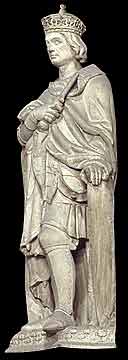Henry VII (b. 1457 r. 1485-1509)
© 2007
Armchair Travel Co. Ltd. - This page may be used for non-commercial purposes
ONLY!
![]()

[ Play
Narrated and Animated Movie ! ] His ingenious scheme was to impose heavy fines in place of imprisonment on the richest transgressors, and by this means his treasury benefited and he himself gained a reputation for clemency.
Henry Tudor took the English crown more by way of force than by birthright, although he was the leading claimant to the throne. Henry was crowned King after his victory over Richard III at the Battle of Bosworth in 1485. This ended thirty years of bitter fighting for the English crown between the Houses of Lancaster and York - The Wars of the Roses. In order to make sure peace continued, Henry married Elizabeth of York (the eldest daughter of the late Edward IV) soon after his coronation - uniting the two houses.
The early years of Henry's reign were troubled by false Yorkist claims to the throne - the two most famous examples being Lambert Simnel and Perkin Warbeck (who pretended to be one of the sons of Edward IV). However, Henry defeated attempts and survived a long reign relatively peacefully.
Henry was a wise, strong and lawful king who set about breaking the power of the English barons and so he revived the Court of Star Chamber. He was also very financially astute and managed to pursue various policies which brought the Royal Exchequer handsomely into credit. Unfortunately because of his fiscal drive some thought him mean and so he was never much loved by his people who thought he lacked warmth and charm.
He dwelt more nobly dead in his Tomb, than he did alive in Richmond or any of his palaces.
He was magnificent in his building; sparing in his rewards.
Henry Tudor of his ambitiousness and covetousness encroacheth and that usurped upon him the name and title of royal estate, notwithstanding he is descended of bastard blood, of the father's side and of the mother's. Whereby it evidently appeareth that no title can nor may in him.
[ Virtual
Tour ] [ Main Topics
Index ]
- Ralph Dutton, English Court Life.
Additional Information on
Henry VII (b. 1457 r. 1485-1509)
QUOTATIONS
- Francis Bacon, History of Henry VII.
- Ibid.
- Richard III King of England, on Henry Tudor.
Explore-Parliament.net: Advanced Category Search
Keyword Categories:
_Object_Sculpture
_Object_Artwork
_Object_Portrait
_Artist_Thames_Bank_Workshop
_King
_Royal_Family
_Man
_Person
_Henry_VII_